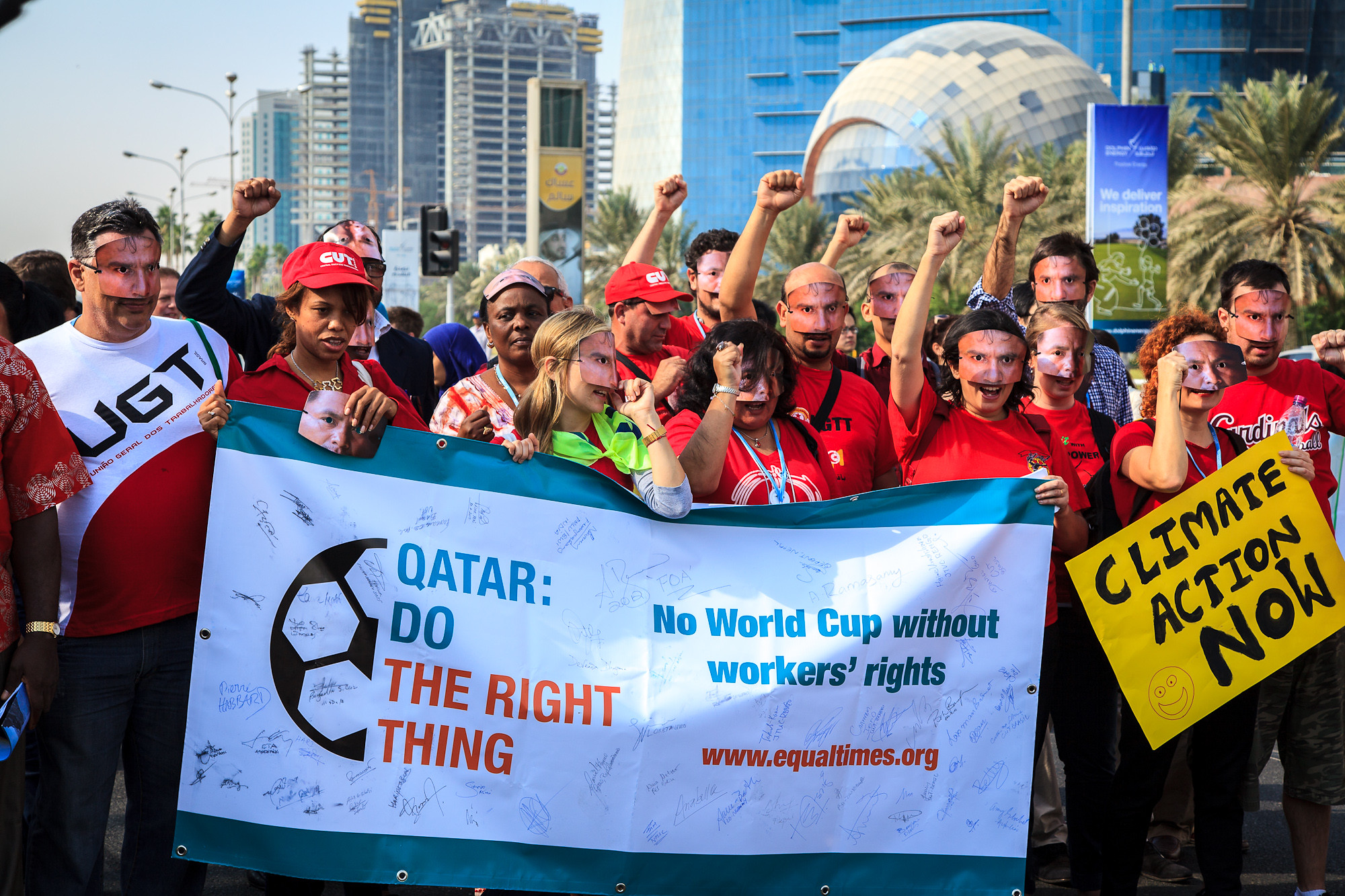“There is no chance to ask for your rights. You just wake up, go to work, and when [your time’s up], go home.” This is the grim reality for hundreds of thousands of migrant workers in Qatar who labor in blazing heat that often climbs to over 100 degrees, typically for longer hours and for less pay than they were initially led to believe. Having paid recruitment fees to get into the country, workers often have no choice but to continue working in circumstances resembling debt bondage.
Qatar has made international headlines for its construction of the 2022 World Cup stadiums which are being built by migrant laborers toiling under conditions that resemble modern-day slavery: their pay has been withheld, they are unable to call home, and they are unable to escape without passports, which employers often illegaly confiscate. FIFA’s ability to exploit migrant workers due to Qatar’s weak labor laws has garnered much media attention, drawing condemnation from international organizations and non-profits. Given the media frenzy, it has become increasingly difficult for the Qatari government to ignore the plight of its migrant workforce.
On October 16, Qatar announced sweeping labor reforms due in part to the international criticism it faced for its laws that all but encouraged the exploitation of migrant workers. International organizations, including the International Labor Organization (ILO) were quick to praise Doha for the announcement, lauding the move as a sign of momentous progress. Despite this development, however, there remain many ways for employers to continue to exploit and abuse migrant workers, particularly within the domestic sphere. Though the announcement of labor reforms is a positive step, the international community must remain vigilant and hold Qatari officials accountable to ensure that workers’ rights are being upheld.
The announced reforms, though vague, notably seek to abolish the Kafala (sponsorship) system. Under the Kafala system, which is used in most Gulf countries, foreign workers are systematically abused. While the World Cup shined a spotlight on the abhorrent conditions workers face in Qatar, the abuse of workers is far more expansive. Ninety-five percent of Qatar’s labor force is migrant, employed mainly in the construction, hospitality, and domestic service industries. The sponsorship system renders these 2 million laborers completely at the mercy of their employers, who sponsor resident permits and visas. Workers may not change jobs or leave the country without obtaining a no-objection certificate from their employers, and patrons may further control the movements of workers by confiscating their travel documents and withholding their pay. Given these circumstances, in which migrant laborers are vulnerable to exploitation and abuse, Qatar’s decision to abolish the system and reform the country’s labor laws has the potential to be enormously impactful for workers’ lives if approved, enacted, and sufficiently enforced.
The new laws create a Kafala-free society in which workers will be able to change jobs and exit the country freely, without having to obtain permission from their current employer. Qatar also announced that it would establish the region’s first non-discriminatory minimum wage, which will apply to workers of all nationalities in all sectors.
Despite the apparent progress of these labor laws, they will be meaningless unless they are properly implemented and enforced. The announcement outlines high level reforms, but does not go into specifics about how and when the Kafala system will be repealed or what the new minimum wage will be. Notably absent from the document is any explanation of enforcement mechanisms for these reforms.
Qatar has a concerning history of passing labor laws but failing to sufficiently enforce them. In February 2017, Qatar adopted a Domestic Workers Law. The law highlighted rights which included a maximum 10-hour work day, one day off per week, and three weeks per year of vacation time. But in November 2018, representatives from two NGOs based in Qatar, Global Detention Project and Migrants-Rights.org, decried the 2017 labor reforms. They cited a lack of enforcement mechanisms and the difficulty of holding employers to account given the personal power employers hold over domestic workers. The 2017 laws were rife with loopholes that employers could exploit to perpetuate grim living conditions for domestic laborers. While the law says that there should be breaks throughout the work-day, it does not specify how many or how often such breaks must be granted, nor does it make clear whether these breaks count as part of the 10-hour work day. While employers are theoretically subject to fines for violating the labor laws, there are no mechanisms, such as workplace inspections, in place to ensure compliance.
By lauding the Qatari government’s announced reforms to abolish the Kafala system, the ILO and other international organizations reinforce Qatar’s image as a progressive regional actor on labor despite the fact that no concrete steps have yet been taken to enact or enforce these newly announced laws. Labor reform legislation is progress, but that progress should not be overstated. Workers would be more empowered if the government allowed unions to form, implemented workplace inspections, or created a justice system that is open to migrant laborers and responsive to their complaints.
Though the international community has been instrumental in calling attention to systematic human rights abuses in Qatar and has been largely successful in encouraging Qatari officials to reform the abusive Kafala system, its involvement must not end there. The ILO and other international organizations must ensure that these labor reforms are not just used by Doha as a positive public relations campaign, without any legitimate or lasting commitment to workers’ rights.
The government must adopt effective and persistent enforcement mechanisms. Qatar is, in theory, on the right path, but there remain many social systems and cultural elements at play that hinder the full exercise of rights by foreign workers. In order to ensure sustainable and persistent labor reforms, the international community must continue to monitor workers’ rights and demand the government implement and uphold enforcement mechanisms.
Photo: Image via Omar Chatriwala (Flickr)
